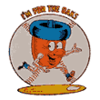Oakland Oaks (PCL)
|
Oakland Oaks 1903–1955 Oakland, California |
|||||
|
|||||
| Class-level | |||||
|---|---|---|---|---|---|
| Previous |
|
||||
| Minor league affiliations | |||||
| League | Pacific Coast League (1903–1955) | ||||
| Major league affiliations | |||||
| Previous | New York Yankees (1935–1937) | ||||
| Minor league titles | |||||
| League titles | 1912, 1926, 1948, 1950, 1954 | ||||
| Team data | |||||
|
Previous names
|
Oakland Oaks (1903–1955) | ||||
|
Previous parks
|
|
||||
The Oakland Oaks were a minor league baseball team in Oakland, California that played in the Pacific Coast League from 1903 through 1955, after which the club transferred to Vancouver, British Columbia. The team was named for the city and used the oak tree and the acorn as its symbols.
Along with the Los Angeles Angels, Portland Beavers, Sacramento Solons, San Francisco Seals, and Seattle Indians, the Oaks were charter members of the Pacific Coast League which was founded in 1903.
In their first year of competition, 1903, the team finished last, and finished either last or next to last place four more times before winning its first PCL pennant in 1912. The Oaks (or "Acorns" as they were also called) played their home games at Freeman's Park at 59th Street and San Pablo Avenue and at Recreation Park in San Francisco.
After the 1912 season, the Oaks opened their new stadium, named Oakland Ball Park (or simply Oaks Park) though it was located in the neighboring city of Emeryville at San Pablo and Park Avenues. In their first season at Oaks Park the Acorns finished last, and were mired in the second division for more than a decade.
In 1916, a struggling Oaks team made history by (inadvertently) breaking the professional baseball color line, as Jimmy Claxton pitched in both ends of a double-header on May 28, 1916. He was introduced to the team as an American Indian, but once the team discovered that his ancestry was both Native American and African, he was fired.
...
Wikipedia


